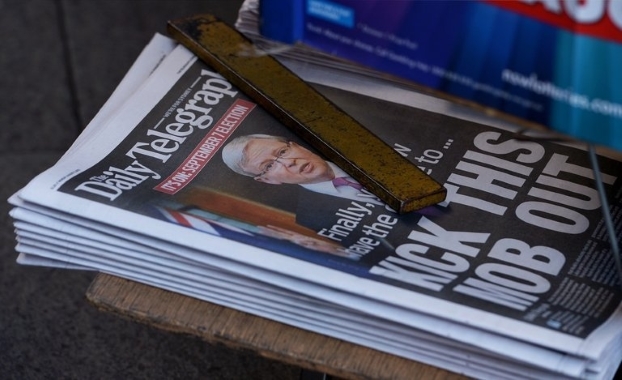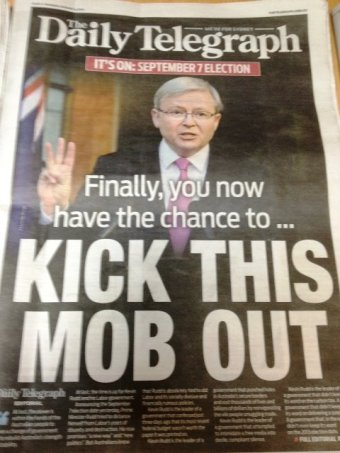
Was the Sydney Daily Telegraph right to take political sides during the election campaign? That depends on your definition of newspaper. And editorial. And propaganda, writes Susie Eisenhuth.
OPINION: Like a lot of much savvier reporters, many of whom went on to illustrious careers as journalists and authors, some of the nation's finest, I did my cadetship on the Telegraph.
It is something I have pointed out often over the years to journalism students at the University of Technology, Sydney (UTS), where I teach, especially when they have, rashly, brashly, ventured the opinion that tabloids are beneath contempt.
Of course we all cringe at the 'Gotcha!' side of the tabloid tradition and lord knows, in the wake of the sleazy revelations of the Leveson Inquiry, none of us can duck the down and dirty tactics of journalism at its trashiest.
But I felt it was important for them to realise there were good, hard lessons to be learned from tabloids at their best: their economy, their wit, the way they forced you to learn to get to the heart of things, sum it up, get it out there quick smart. The first draft of history stuff - accurate basics, brief accounts that could go on the record, be picked up and developed by the next writer.
As cadets we were marched daily to shorthand, because, we were told, that was the only way to be accurate, at speed.
Nobody talked about ethics much, or at all, as I recall. But accuracy was drummed into us. Get it right. Get it first, of course, but get it right.
And one other thing, which I delight in telling students because it's always remained central to my own writing, however sophisticated I thought I had become: "Tight and bright, Susie, tight and bright!".
Veteran journo mantra
That was the mantra of the veteran journo lumbered with knocking me into shape, cheerfully slashing his way through my wordy copy with his red pen. Sentences way too long. What are those? Adjectives? Adverbs? Don't need 'em, Suse. Tight and bright.
These days, decades later, the students, doing the equivalent of a cadetship within their vocationally-oriented university courses, get their tight and bright lessons embedded within a broader consideration of ethical professional practice.
But when you get right down to it, as you push them out to report on events in the real world, the basics are much the same.
And the mantra I repeat - a checklist for their on-the-run reporting - isn't so different from what I learned as a kid at the Tele. Accuracy, clarity, fairness and balance.
Plus I generally remember to mention the words of investigative journalist Chris Masters, of Four Corners renown, (who himself took up a position with the Telegraph when he retired from the ABC), telling one of my classes that reporting in the public interest came down to some very basic principles.
Whatever else you do, he told the students, don't forget the importance of fairness. Fairness was the key to good reporting.
 I thought about that notion of fairness the day the Telegraph published its "Kick this mob out" front page.
I thought about that notion of fairness the day the Telegraph published its "Kick this mob out" front page.
Pathetically skewed
And as I read its election coverage in subsequent weeks, noting the pathetically skewed tally of pro-Coalition versus pro-Labor stories diligently logged by the ABC's Media Watch.
Various commentators were quick to make the point that the paper was within its rights, that it was okay for the Telegraph's proprietor to 'editorialise' on his newspaper's front page.
Well I guess that depends on your definition of newspaper. And editorial. And propaganda. But I was thinking more about the reporters, charged with steering a middle course in the public interest. And the cowing effect of His Masters Voice.
We knew Rupert didn't have a code of ethics. But they do. So does their paper, for that matter, a code of behaviour clearly spelled out on its website. Under the heading in bold: Accuracy.
Even the first few points it cites suggest we all know what's right and wrong. Facts must be reported impartially, accurately and with integrity, reasonable steps should be taken to ensure reports are accurate, fair and balanced; a clear distinction must be made between fact, conjecture, comment and opinion; all sides of the story should be told. And so on.
How did those reporters feel about what was going down on their paper? Did they feel pressured? Could they dissent if they wanted to? I clearly recall being impressed all those years ago when journos I knew at the Australian went on strike, taking their argument, and their alternative paper, to the streets, when that same proprietor interfered with the proper processes of political reporting.
How things have changed. Jobs in journalism are way scarcer now of course. Times are tough, people have mortgages, pressures to do what they feel they must.
Resigned in high dudgeon
A decade ago I resigned in high dudgeon from The Bulletin after differences with an editor who wanted to change my copy on a matter I thought mattered (a minor matter, in comparison).
But I had another source of income, did the weekly column on the side, could afford to make what I felt was an ethical stand, though the mortgage took a hit.
These days work options in journalism have been shrink-wrapped, like the traditional media itself – or 'legacy' media as it has now, tellingly, been labelled.
These days frank and fearless reporting in the public interest is in danger of sounding as dated as Redford and Hoffman and All the President's Men.
I thought of Chris Masters and his advice to fledgling reporters again on election night when the inevitable result became apparent. People were gathering all over at election night parties. Celebrating the triumph of the new PM, seeing off the old one. And I thought of those Tele reporters.
Would they be having an election night party? Would they be having a knees-up, as journos have traditionally done, taking a well-earned break at the end of the frenzy of reporting an election campaign demands, job well done.
Or given the stance of their paper, would they be celebrating like the other lot, the people with a vested interest in the outcome, celebrating that their bloke won.
I'm not sure I'll reach so readily for my cadetship stories to impart those basic tenets to my students in future, not sure I'll still enjoy spinning a funny yarn about being young and clueless and learning the craft on the Telegraph.
Fond memories not so fond now. It feels like a loss. And not just for me.
Susie Eisenhuth teaches journalism at the University of Technology, Sydney.This article was first published on tghe ABC's The Drum.
This work is licensed under a Creative Commons Attribution-NonCommercial 3.0 New Zealand Licence.




